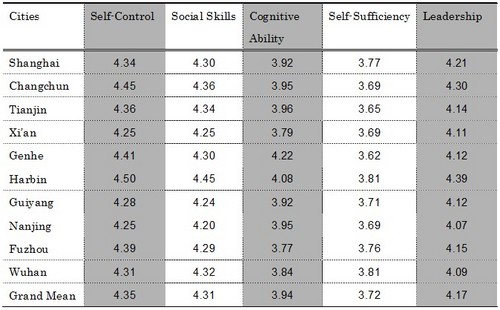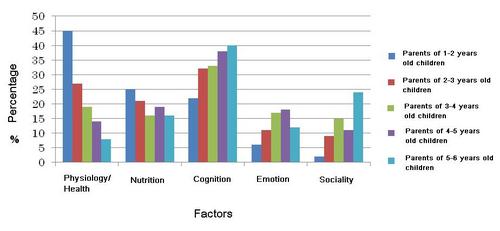<Statement of the Problem>
Due to traditional Chinese culture and the implementation of China's One-Child Policy, most of the Chinese parents of children 1-6 years old grew up with high parental expectations. In 1997, a large-scale study was conducted in both Shanghai and Tokyo concerning the expectations of parents of 1-6-year-olds of their children's ability. In response to the question: What kind of education do you want your child to have in the future?, 50 percent of the parents in Tokyo answered that they wanted their child to graduate from either junior college, technical college, or university and the remaining 50 percent responded that their child's educational level did not matter. The responses of the parents in Shanghai were in contrast to those of Japanese parents. 100 percent of them wished their child to graduate at least from university, including 50 percent wanted their child to obtain doctoral degree. Such expectation for a higher educational status may partially reflect traditional Chinese culture. Good grades have been considered the path to government service and all occupations were considered inferior to that of a civil servant appointed by the emperor of China. Such notions have been inculcated in generations of Chinese parents for two thousand years.
After the first generation of children born under China's One-Child Policy with their parents' high expectations grew up and became parents, what expectations do they have of their children's ability? How are the expectations of new parents different from that of their own parents? To answer these questions, we surveyed parents of children 1-6 years old, choosing 11 cities with different levels of economic development in eastern, western, southern, northern and central China.
<Survey Method>
1. Participants
1) Selection of Sample Areas
Sample areas were selected based on the following two criteria: 1) It must be a representative area and 2) It has a representative economical situation.
The sample areas selected from a geographical point of view are as follows: Shanghai, Nanjing, and Hangzhou from East China; Guiyang and Fuzhou from South China; Wuhan from Center China; Tianjin from North China; Genhe, Changchun, and Harbin from Northeast China; and Xi'an from Northwest China.
As for the perspective of economic situation, Shanghai, Nanjing, and Hangzhou from East China are considered as developed areas; Guiyang and Genhe as undeveloped areas; and other six areas as in-between.
2) Ages of the Participants
The ages of participating fathers of children 1-6 years old in each area range from 32 to 36, with an average age of 34, while mothers are from 30 to 32, with an average age of 31. The participants are a group of young parents.
3) Educational Status of the Participants
With the exception of many fathers from undeveloped area such as Genhe and Guiyang who had graduated from either junior high school or high school, most of the participating fathers from other sample areas had graduated from university and some of them had earned master's and doctoral degrees.
The mothers' situation is similar to that of fathers. Mothers from nine areas other than Genhe and Guiyang had graduated from university or technical college.
This shows that the participants of this survey are the mixed group, with a majority of having a high level of education and a minority having a low level of education.
4) Occupation of the Participants
As for the nine areas other then Genhe and Guiyang, most of the participating fathers are white-collar employees such as public servants and business managers, while most of those from Genhe and Guiyang are blue-collar employees or unemployed.
As for mothers, those from Changchun, Tianjin, Xi'an, Harbin, Shanghai, and Hangzhou have high social and economic status and are white-collar employees such as science education personnel, public servants, and business managers. Only in Genhe are most of the participating mothers unemployed. Mothers' occupations from Nanjing and Guiyang are relatively varied.
Many participants of this survey have an occupation with high social and economic status, and the nature of occupations varies.
In sum, the participants of this survey represent various economic areas and ages. Although most of them engage in the occupations with high social economic status, this is a group of people of varied educational status and occupations. It should be said that this group of participants thoroughly reflects the expectations and feelings of parents of 1-6-year-olds, particularly with high social and economic status, regarding their children's ability.
<Contents of the Survey>
The survey consists of two parts. One is the Checklist regarding the parents' expectations of their children's ability, using a five-point scale ranging from "I do not expect it. (1 point)" to "I do expect it very much. (5 points)". The other is an Open-End Test asking parents what aspect they wish their child to develop.
We interviewed 10 parents of children 1-6 years old in order to create the checklist regarding the expectations of their children's ability, and 5 factors were extracted by factor analysis. The details of each factor are as follows.
Factor 1: Self-Control
You expect your child:
- not to waste money
- to be willing to lend favorite toys to friends
- to do things after being permitted
- not to interrupt the conversation of adults
Factor 2: Social skills
You expect your child to:
- care about small animals and help others
- greet teachers and family members
- say "thank you" when helped
- wait in line voluntarily
- ask for help in a courteous manner
Factor 3: Cognitive Ability
You expect your child to:
- be able to say easy words in English
- know numbers 1 -10
- read and write easy Chinese characters
- tell time on analog clock
Factor 4: Self-Sufficiency
You expect your child to:
- be able to stay at home alone for one hour
- be able to play outside alone
- use childproof scissors without help
- sleep alone at night
Factor 5: Leadership
You expect your child to:
- reason with friends having different opinions
- display leadership among friends
- control emotions during a conflict with friends
- be popular with friends
The coefficient of internal consistency reliability test of this survey was 0.72, which corroborated its high reliability.
<Results of the Survey>
1. Results of the survey on the expectations of children's ability
Table 1 shows the results of the checklist completed by the participants from 11 cities regarding the expectations of their children.
Table 1. Mean values of parental expectations of children's abilities in 11 cities

Enlarge
As shown in Table 1, the factors of ability that the parents of 1-6-year-olds from 11 cities expect their children to develop the most are: Self-Control, Social Skills, Leadership, Cognitive Ability, and Self-Sufficiency, respectively. We had thought that Chinese parents would place the most importance on cognitive ability. As such, it is somewhat surprising that the result turned out to be different. "Self-Sufficiency" is downplayed, as in the past.
Regarding the degree of parental expectation in each city, parents in Harbin show the highest. Except for Cognitive Ability, their mean values for the other four factors are higher than those of parents in other cities. On the contrary, the degree of parental expectation in Nanjing is relatively low for all factors. Parental expectation of children's cognitive ability is the highest in Genhe. According to these data, parents' expectation of their child's abilities is in inverse proportion to the economic development of the city.
2. The Most Important Area of Development for Parents
We performed cluster analysis on the Open-End Test given to the participants: What aspect do you wish your child to develop?, and obtained 5 clusters: "Physiology/Health" "Nutrition" "Cognitive Development" "Emotional Development" and "Social Development." The responses that did not fit into these clusters were excluded. Figure 1 shows the details.
Figure 1. Results of factor analysis of Open-Ended Test completed by the participants

Enlarge
As shown in Figure 1, the aspect of development that parents consider to be the most important changes from physiology and health to psychological development as children get older. At any age, however, expectations of cognitive development exceed those of emotional and social development. In addition, the degree of importance given to cognitive development increases as children get older.
<Discussion and Consideration>
When put all these things together, it may be said that the parents of 1-6 years old children representing various areas in China with diverse economic status show an attitude of ambivalence to child rearing. Living in the global information age, the parents of 1-6-year-olds in 11 cities in China are influenced by international principles of child rearing. Their traditionally high expectations of Intellectual Development have shifted to expectations regarding Self-Control, Social Skills, and Leadership. Moreover, their expectations of such non-cognitive abilities exceed those of cognitive ability. On the other hand, the traditional way of thinking still persists and the development of Self-Sufficiency is considered unimportant. As other evidence of parents' ambivalence toward child rearing, there is the gap between expectations for the development of their children's ability and the issues that they are actually given importance. Parents of 1-6-year-olds, at all ages, give more importance to cognitive ability than to emotional and social development.
Concerning this kind of parental ambivalence, we should not just wait patiently until they can resolve their cognitive conflict, but provide suggestions at the appropriate time so that they can resolve the ambivalence generated by the gap between reality and tradition as well as from the differences in expectations and actual concerns.














